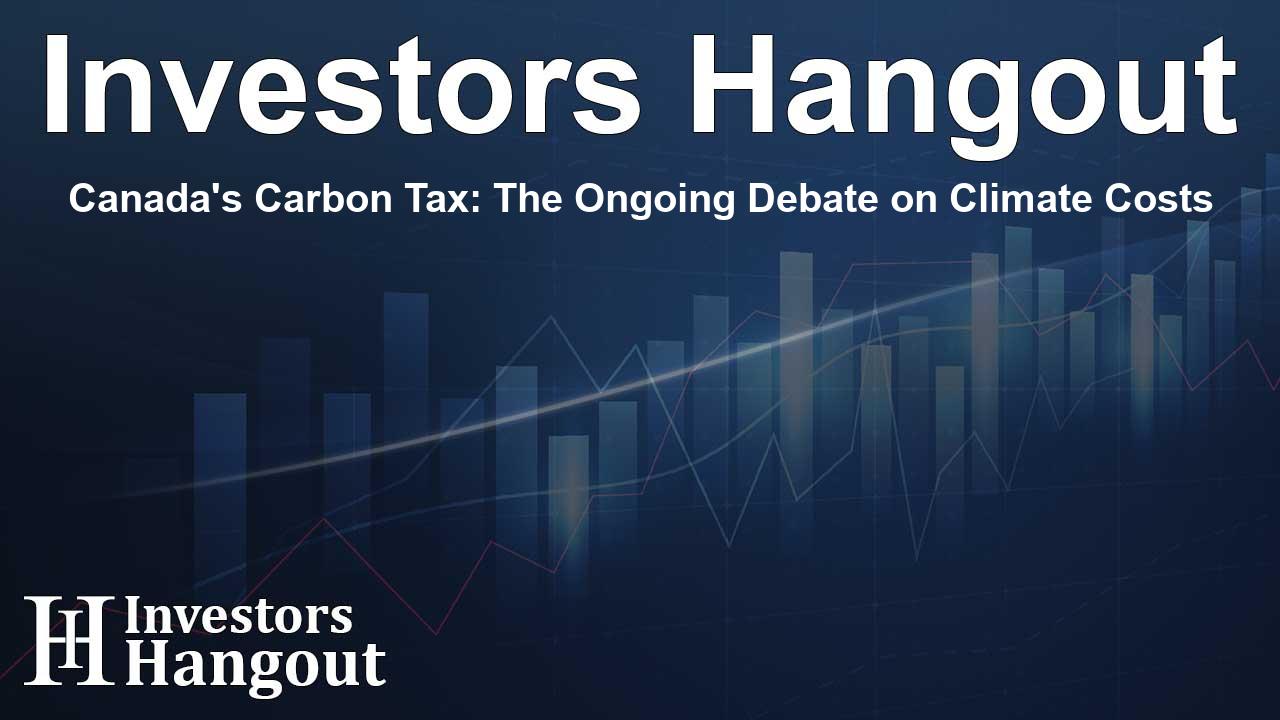Canada's Carbon Tax: The Ongoing Debate on Climate Costs

Friends of Science Society Highlights Ongoing Carbon Tax Debate
The Friends of Science Society recently released insights regarding Canada's carbon tax, emphasizing that while the tax is currently set to zero, it remains a divisive issue among Canadians. Despite the temporary reprieve, the financial implications on citizens and the environment are still a matter of concern.
Understanding the Carbon Tax Impact
The carbon tax, introduced in Canada in 2017, aimed to offset carbon emissions by imposing a financial burden on polluters. Initially portrayed by former Environment and Climate Change Minister Catherine McKenna as costing consumers just pennies per liter of gasoline, the implications have proven more complex.
The Friends of Science Society's research director, Ken Gregory, analyzed the financial aspects using the widely recognized FUND economic model. His findings reveal that the social benefits of carbon dioxide emissions might outweigh the costs attributed to carbon emissions. According to the analysis, the social cost of carbon is estimated to be $7 per ton of CO2 at a 3% discount rate, adjusting for various factors including urban heat and fertilization effects. This adjustment suggests that the overall cost of carbon could be negative, indicating potential advantages from CO2 emissions.
Video Analysis and Public Response
A new video designed by the Friends of Science Society provides accessibility to these findings, aiming to inform the public on the complexities surrounding the carbon tax and CO2 emissions. Citizens are invited to question existing narratives surrounding climate costs and the true implications of carbon pricing.
The Political Landscape
In recent years, political shifts have influenced environmental policy. After assuming office, Prime Minister Mark Carney made the decision to set the carbon price to zero, acknowledging public discontent. Despite this created pause in the tax, the underlying issues related to climate risk remain critical.
Amidst the political discourse, some advocates have criticized the carbon pricing system, calling it an ineffective solution to global climate challenges. In contrast, McKenna continues to defend the original policy, framing it as a necessary step towards long-term sustainability. Her new book also explores her ideological battles to maintain climate initiatives despite shifting political views in the United States.
Concerns About Future Regulations
The Friends of Science Society also cautions against potential future increases in carbon pricing. Reports indicate that entities like the Network for Greening the Financial System (NGFS) suggest imposing even higher costs to meet ambitious climate goals. With proposals for carbon pricing reaching as high as $800 per ton to achieve net-zero emissions by 2050, potential impacts on the economy and society could become significant.
The Case for Reevaluating the Conversation Around Climate
In light of these concerns, individuals within the Friends of Science Society argue that the conversation around climate change and taxation should be reframed. A more balanced discussion could facilitate a better understanding of the actual risks versus the projected scenarios presented by various political entities. The society urges individuals to critically assess the implications of carbon policies and their potential effects on both the environment and the economy.
Climate Science and Public Perception
The recent U.S. Department of Energy report challenges some of the more extreme claims regarding climate change's economic impact. As discussions continue about future climate actions, examining scientific research can offer essential insights into the realities of climate change and appropriate responses.
Frequently Asked Questions
What is the current status of Canada’s carbon tax?
The carbon tax is currently set to zero, yet it remains a topic of considerable debate and scrutiny among Canadians.
Who is Ken Gregory?
Ken Gregory is the research director at the Friends of Science Society, where he utilizes economic models to analyze the implications of carbon emissions and policy.
What are the potential financial implications of carbon emissions?
According to recent analyses, the potential benefits of CO2 emissions may outweigh associated costs, suggesting a need to revisit current carbon taxation strategies.
How is the carbon tax connected to political changes?
The reduction of the carbon tax reflects shifts in political sentiment and public opinion regarding climate policies and their economic impact.
Where can I find more information on the Friends of Science Society?
The Friends of Science Society explores the scientific aspects of climate change. For more information, visit their official website.
About The Author
Contact Lucas Young privately here. Or send an email with ATTN: Lucas Young as the subject to contact@investorshangout.com.
About Investors Hangout
Investors Hangout is a leading online stock forum for financial discussion and learning, offering a wide range of free tools and resources. It draws in traders of all levels, who exchange market knowledge, investigate trading tactics, and keep an eye on industry developments in real time. Featuring financial articles, stock message boards, quotes, charts, company profiles, and live news updates. Through cooperative learning and a wealth of informational resources, it helps users from novices creating their first portfolios to experts honing their techniques. Join Investors Hangout today: https://investorshangout.com/
The content of this article is based on factual, publicly available information and does not represent legal, financial, or investment advice. Investors Hangout does not offer financial advice, and the author is not a licensed financial advisor. Consult a qualified advisor before making any financial or investment decisions based on this article. This article should not be considered advice to purchase, sell, or hold any securities or other investments. If any of the material provided here is inaccurate, please contact us for corrections.
